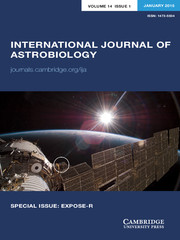Article contents
Mars: a free planet?
Published online by Cambridge University Press: 07 June 2021
Abstract
We are witnessing the enormous breakthroughs of space technology, which will eventually allow us to reach Mars. However, it seems that the technological evolution is expanding at a faster rate than the moral development. Are we ethically ready to take human beings to Mars? Will it be a private company the first one that manages to take us there? Should we colonize Mars or leave it like it is right now? Are astrobiological interests being contemplated when discussing human presence in Mars? These are some of the questions that we must answer since the moment of stepping on Mars does not seem to be far away. Therefore, the objective of this article is to evaluate the idea of Mars being a free planet from any of Earth's governments, and to analyse the idea of colonizing Mars considering that by doing that we could seriously endanger native life. What it proposed is that its unavoidable that we will reach Mars, however, we may not be prepared as humanity and this is something that we must face.
- Type
- Research Article
- Information
- Copyright
- Copyright © The Author(s), 2021. Published by Cambridge University Press
References
- 1
- Cited by



